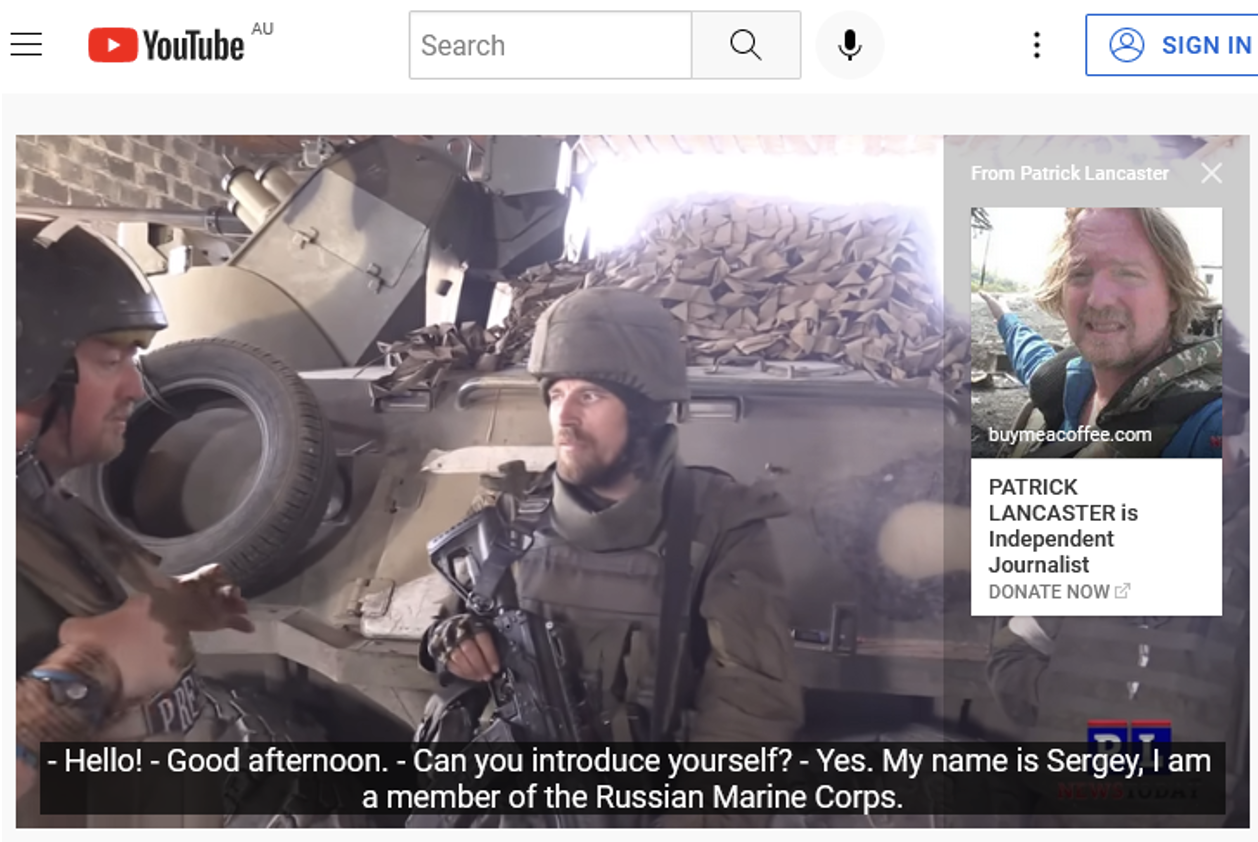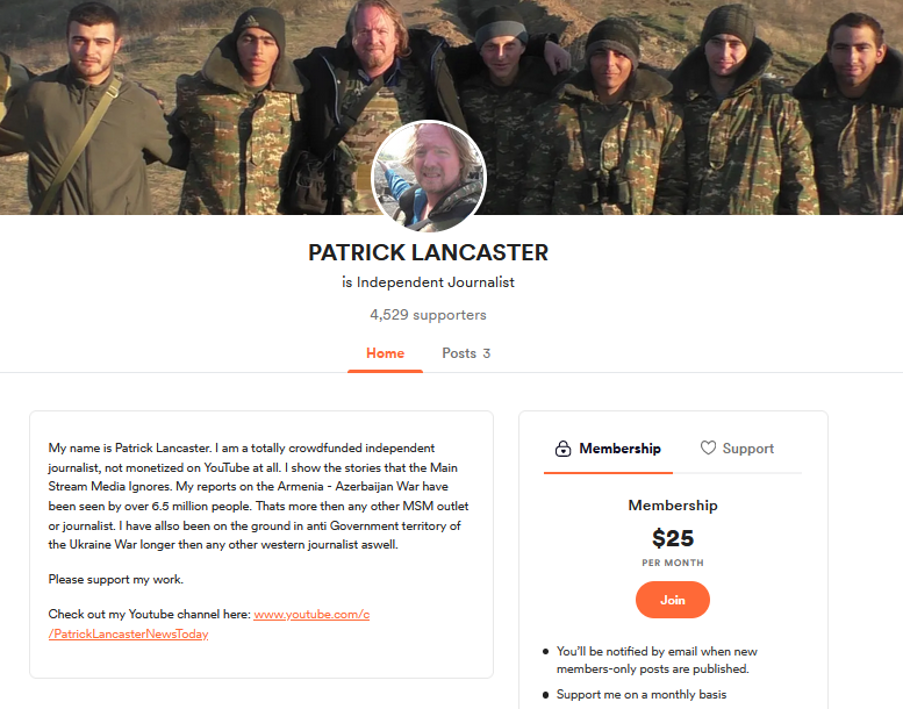Since the early days of Russia’s 2014 covert invasion of Ukraine, and particularly since the overt, full-scale invasion of February 2022, foreign fringe “journalists” have been a key plank in Russia’s propaganda strategy.
While genuinely independent journalists in the occupied territories of Donetsk and Lugansk faced harassment, violent repression including alleged torture and imprisonment on trumped up charges, a small number of foreigners such as Patrick Lancaster, Graham Phillips and Christelle Néant have been permitted to live and operate for years from occupied territories in the Donbass. They have been actively supported by pro-Russian authorities to continue producing content for their social media channels.
This has included media tours organised by the Russian army; access to conflict zones and recently captured areas supported by the Russian and local pro-Russian forces; and interviews with members of the Russian and pro-Russian forces. In July 2022, Russian state television even made a documentary about these “independent Western journalists” operating in the Donbass.

Screenshot of YouTube video posted by Patrick Lancaster, showing Lancaster in Azovstal in Mariupol, interviewing a member of the Russian military. Lancaster claims to have been the first Western journalist to access Azovstal after its capture by Russian forces.
These content creators have been widely accused of promoting Russian propaganda and disinformation about the war in Ukraine, including denying evidence of Russian war crimes in Bucha and elsewhere. Graham Phillips has also potentially committed his own breaches of the Geneva Convention by interviewing prisoners of war. Phillips became the first British citizen to be individually sanctioned by the United Kingdom for his role in the Ukrainian conflict on July 26th.
Yet the complete financial picture for these content creators is unclear. One aspect which is apparent, however, is that some are continuing to generate revenue via US-based crowdfunding platforms. This raises significant questions about potential sanctions violations by the crowdfunding platforms.
This Eyes on Russia explainer will focus on two examples as an illustration of this broader dynamic: Patrick Lancaster and Graham Phillips.
The Donetsk and Lugansk People’s Republics have been under varying levels of sanctions by the US and other jurisdictions since 2014. These sanctions were significantly expanded in 2022 following the full-scale Russian invasion of Ukraine.
Most pertinently, on February 21st President Joe Biden signed Executive Order 14065 which levelled wide-ranging sanctions against the territories of the DNR and LNR. Many international companies, including a wide array of financial institutions, all major international credit card companies and many smaller payment service providers, responded by suspending or ceasing to provide services to users in the DNR and LNR as of March 21st, 2022.
To state the obvious, Patrick Lancaster and Graham Phillips are clearly in the sanctioned territories. Both men have worked and lived in the regions for years. Despite this they maintain accounts and appear to be continuing to receive funds through primarily US-owned crowdfunding platforms, in apparent defiance of US sanctions.
Until July 29th, for example, Graham Phillips continued to have a Patreon account earning $487 a month. The account appears to have since been taken down, presumably due to Phillips having been personally placed under UK sanctions as of July 26th.
Even before the UK’s announcement, Phillips’ use of Patreon to fund his activities in the DPR and other parts of occupied Ukraine (which, as mentioned above, includes committing potential Geneva Convention violations) was presumably a failure to implement Patreon’s Sanctions Policy. Patreon states that it complies with US sanctions law and “cannot take part in transactions that involve designated people, places, or items that originate from those places.”
Phillips’ PayPal account is also still accessible to donors as of July 29th. PayPal left the Russian market in March in response to the sanctions. Phillips appears to have been making money from YouTube ad revenue for many years, but he has said that the controversy over his interview of a prisoner of war led YouTube to demonetise his channel in April 2022.
Patrick Lancaster also has a Patreon account, although it appears he has not been actively using it since May 2022. Instead, Lancaster has turned to Buy Me A Coffee, a US-based platform which allows for micropayments or ongoing subscriptions. Buy Me A Coffee uses Stripe, also based in the US, as a payment processor.
Lancaster openly states in his description on Buy Me A Coffee that he has been active in the Ukrainian occupied territories “longer then [sic] any other western journalist aswell [sic].” Even a very cursory review of Lancaster’s account should therefore have recognised the potential sanctions risk.

Screenshot of Patrick Lancaster’s Buy Me A Coffee account, captured July 29th 2022.
Buy Me A Coffee does not appear to have a specific sanctions policy available on its website, nor are sanctions mentioned in its Terms of Service as of July 2022. It is unclear what processes the company has in place to ensure OFAC sanctions law is adhered to.
Stripe, which provides the payment processing for Buy Me A Coffee (and so presumably is the party most directly involved in transferring funds to Lancaster) does have a sanctions policy, but it is not clear how effectively this is being implemented via third party services such as Buy Me A Coffee.
Lancaster and Phillips are just two examples among the cottage industry of fringe content creators which has sprung up around Russia’s wars in Ukraine and Syria, but their success in using crowdfunding and payment platforms raises a broader issue.
Both men often directly state their location on their accounts. Even when they do not, their activities as pro-Russian propagandists in occupied Ukraine have been widely reported on in the international media. A simple Google search of their names would presumably be enough to send up a red flag for payment platforms.
The ability of Lancaster and Phillips to continue operating on US-based payment platforms despite being obviously located in a sanctioned region raises significant questions about how effectively crowdfunding and payment platforms are implementing sanctions against the Russian-occupied territories of Ukraine.

